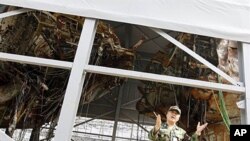South Korea is no longer adamant that North Korea must apologize for the sinking of a naval vessel before talks on ending its nuclear weapons programs can resume, a senior South Korean official said.
Since the sinking of the Cheonan in March, Seoul has repeatedly insisted that Pyongyang first apologize before the six-nation talks can restart.
But on Monday, the official told foreign correspondents in Seoul
“We do not directly link [an apology] to the six-party talks” but such a gesture would have an influence on whether they do restart. The official spoke on condition his name not be released.
The Cheonan exploded and sank in the Yellow Sea. An international investigation into the incident, in which 46 South Korean sailors died, blamed a North Korean torpedo. Pyongyang denied any involvement.
In recent months, South Korea and other governments have discussed restarting the negotiations. But officials here emphasize that Pyongyang must first show its sincerity about wanting to give up its nuclear weapons.
Diplomats say that at an Asian leaders’ meeting last week in Hanoi, the Chinese, South Koreans and Japanese agreed not to rush to restart talks until they can produce tangible results.
“There is some demand [from other partners], but not enormous pressure,” to resume the six-way talks, the South Korean official said Monday. “We want to do it in the right way.”
The official expects no quick solution to the North Korean nuclear issue, predicting the “denuclearization of North Korea will be a long process … there is no quick fix.”
The six-party talks, involving both Koreas, China, the United States, Japan and Russia, began in August 2003.
In 2007, North Korea shut down its main plutonium-producing plant and agreed to end all nuclear programs in exchange for aid and diplomatic concessions. Under the eyes of U.S. experts it removed 8,000 fuel rods from the nuclear reactor at Yongbyon.
North Korea, however, walked out of the talks in April 2009 and announced it would re-start operations at Yongbyon.
Although some Western diplomats oppose resuming the discussions, noting Pyongyang’s repeated breaking of international agreements, the South Korean official said the lack of a negotiating framework is akin to wrestlers fighting under the ring and smashing chairs on each others’ heads.
“It is better to get back into the ring and play by the rules,” he said.
The timing and substance of new talks, he said, would be influenced by “internal dynamics” in North Korea – namely the succession issue. In addition, what he termed “Chinese strategic thinking” would factor into the talks.
In recent weeks, it has become clear that North Korean leader Kim Jong Il intends his third son, Kim Jong Un, believed to be about 27 years old, to succeed him.
The official said there is not much reason to believe that the younger Kim would change course in the impoverished and reclusive communist country.
“He’s part of the regime and his minders are part of the regime,” the official said. “But once he goes up on his own, he may try something different.”
That, however, could be decades down the road, the official said.
South Korean President Lee Myoung-bak has taken a two-track approach in engaging North Korea, combining dialogue with pressure and sanctions. That differs from two previous governments, which used heavy amounts of aid to Pyongyang to keep talks going.
The South Korean official Monday said that North Korea took advantage of the single-track approach.
The South Korean official acknowledged to reporters that during those years Seoul gave several billion dollars to Pyongyang and that money “probably” helped North Korea with its nuclear weapons program.
“We were generous,” he said.
While the current South Korean government has taken a harder line, the official denied Seoul advocates the end of Kim family rule in Pyongyang.
“We have no such plan to promote regime collapse or regime change,” he said, expressing skepticism that South Korea or any outside entity can dictate change in the North. That would only come about, he predicted, through a crack in the North Korean elite or an internal change in the power structure in Pyongyang.









